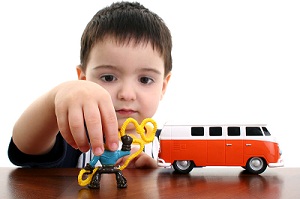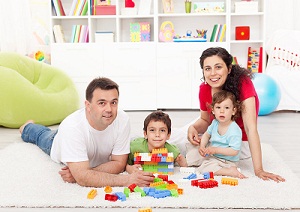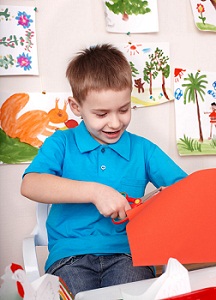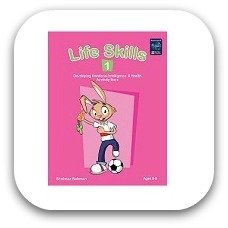The Benefits of Play
By Shahnaz Bahman
As parents we all strive to see our children happy. We are all keen on seeing our children doing well in all areas of life. The question is how can we help our children develop these skills?

There is a beautiful pathway that can lead children to astonishing results. PLAY is the magic word here.
Why play is so important.
Play is more than just fun for children. Play is the way children learn and grow. It is often through play that children learn to make sense of the world around them. Through play children can grow cognitively, their curiosity is encouraged, they ask questions, solve problems and make their own judgments and decisions as they go along. Through play children develop their physical coordination; they drop and pick up objects, score or misscore, and learn to adjust their movements as they experiment with things. Children even learn when they make a complete mess out of what they are doing. It’s a beautiful process of learning, reflecting, evaluating and adjusting until they get it right.
When children play with their friends and siblings, one minute they can be excited,
another minute we see their tears dropping. They smile, they giggle, they fight, they
solve problems, they agree, they disagree and then they hold hands again. These are
precious learning moments. It’s through these experiences that children develop
emotionally and socially. When they solve their own problems they feel a sense of
achievement, they become more confident and this develops their character. Play is the key to children’s natural growth on all different levels.
Creating a supportive, safe environment
Creating a home environment where play is appreciated and encouraged can have a very positive impact on children. Here are a few ideas:
• Have toys and games within reach of children. Having toys nicely packed in their boxes or nicely displayed on shelves, or stored in a wardrobe might not be very encouraging.
• It would be good if your child can have a room or a corner in the house for play. This can be their corner and they should feel comfortable to use it without having to worry about following too many rules.
• Remove unsafe items
• Remove breakable or precious items. This is to avoid accidents. Blaming children for their mistakes or punishing them can ruin the joy of play. Mistakes are part of their learning experience. They can be used to gently guide the child to see how things could have been done differently. By doing this and not reacting to the mistake itself, the moment can be turned into a precious learning opportunity.
How parents can support their children's play

The most important support parents can provide is to organise their children’s time so they have enough time to play. Children need time to play alone, with their siblings, friends or even with their parents. When we plan our children’s daily schedule, play should be given its chunk of time and should be thought of as an essential part of their life. It would be a good idea to reflect on how your children spend their time. Spending long hours watching TV, films or playing video games is not a productive way of spending their time. Watching too much TV not only takes away a child’s play time, it also can negatively affect children’s cognitive development.
How parents can support their children's play
The
most important support parents can provide is to organise their
children’s time so they have enough time to play. Children need time to
play alone, with their siblings, friends or even with their parents.
When we plan our children’s daily schedule, play should be given its
chunk of time and should be thought of as an essential part of their
life. It would be a good idea to reflect on how your children spend
their time. Spending long hours watching TV, films or playing video
games is not a productive way of spending their time. Watching too much
TV not only takes away a child’s play time, it also can negatively
affect children’s cognitive development.

Have fun with your children
Play with your child as much as you can. Spending quality playtime with children when they are young, builds the foundation of having good adult relationship. Converse with your child as you play together, build trust, love and mutual respect. If this is done continuously, the communication channel will be kept open. It will be valuable to use when children and parents need it most, especially when a child is going through tough times or unpleasant experiences.
While playing with children, it is important to remember that it is their play time. Observe your child, get to know how they think, feel, what they like or dislike and the way they play and respect that. Avoid playing a parent’s or a teacher’s role where you might fall into the trap of using play time as a teaching lesson. The focus here should be for your child to have fun, enjoy playing and your presence. It is also important to know that getting things right or wrong doesn’t matter here. For example, if you are at the beach with your child and the child is building a castle, it doesn’t really matter if it looks like a castle or not. So, you don’t have to teach them how to build a castle correctly; putting the emphasis on getting things right during play kills children’s creativity and takes away their self-confidence which is much more important than building a perfect castle.
Choosing toys
Choose toys that are appropriate for the child’s age and match their interest.
Remember, when choosing a toy, to consider whether a child must be supervised
while playing with it. Toys or items should be totally safe and not have small parts that break easily or could be swallowed. They do not have to be expensive or complicated to be beneficial to the child. Common objects such as pots and pans, empty boxes, shoelaces and wooden spoons can be interesting to children, stimulating their brains. What’s more important than the toy here is parent’s active participation.
The language we use
While communicating with children, watch the language you use. It’s much better to use guiding positive language than negative language. For example, you may tell a child “walk” or “be careful” instead of “don’t run”, “watch out you will fall” or “if you do this you will hurt yourself badly” . Using negative language not only takes
away the joy of playing, it can be deconstructive and gives no guidance. Using
negative language very frequently or focusing on what might go wrong while
playing can create unnecessary fears in children.

Play enables children to learn new concepts and develop new skills.
• Playing board games can develop number skills, reading skills, taking turns and making decisions.
• Threading beads can help children learn about colour and shape and improves eye-hand coordination.
• Cutting pictures out of magazines can become an opportunity to develop language skills, improve visual intelligence and eye hand coordination.
• Playing with blocks can develop key math concepts such as sorting, grouping and estimating.
• Playing with dolls can improve self expression, imagination, problem solving and understanding of social roles and norms.
|
|



